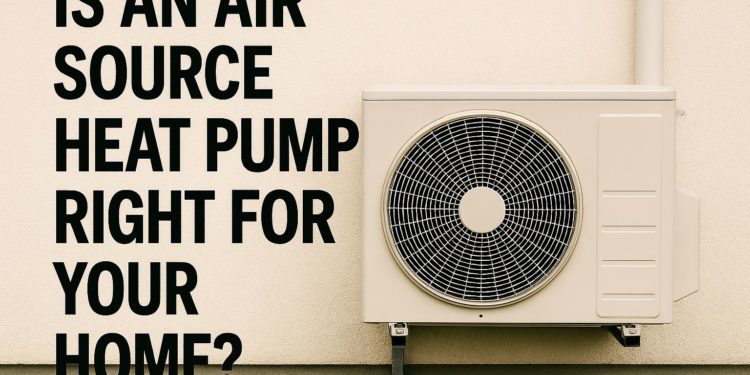Picking the most appropriate heating system is paramount to comfort and cost savings. Everyone in the UK is asking themselves, is an air source heat pump the way forward?
It is a new technology that uses outside air to heat your home. Is it suitable for you, though? Let us consider the advantages, disadvantages, and things to think about before deciding.
What Is an Air Source Heat Pump?
An air source heat pump, or ASHP, extracts heat from outside air. It operates in low temperatures. The equipment utilizes electricity to power the pump.
It then circulates heat into your building through radiators or underfloor heating. In the summer, it also cools your building. It is an eco-friendly choice since it uses less carbon and less fuel.
How Does It Work?
The pump pulls air from outside your home. A refrigerant fluid absorbs the heat from this air. This fluid is compressed to increase the temperature.
The heat is then moved into your home’s system. It provides steady heating without burning gas or oil. It works much like a fridge, but in reverse.
Benefits of Air Source Heat Pumps
There are many reasons people choose heat pumps. They are energy efficient and eco-friendly. They can cut your carbon footprint. They may also lower energy bills if your home is well insulated.
They require less maintenance than gas boilers. They can heat water for showers and baths. They provide long-term savings over their lifespan, which can last 15–20 years.
Possible Drawbacks to Consider
Air source heat pumps are not perfect. They can cost more to install than boilers. They work best in homes with good insulation. In older, poorly insulated homes, heat may escape quickly.
They can be less effective in very cold areas. The system needs outdoor space for the pump unit. They may not heat water as hot as gas boilers without extra help. Electricity costs can also affect savings.
Are They Right for UK Homes?
Many UK homes can benefit from a heat pump. They are suitable for well-insulated homes with double glazing. They are suitable for new energy-saving buildings.
They may require a slight renovation for old homes. Adding loft or wall insulation makes the pump more effective. Homes without garden or outdoor space may struggle to fit the unit.
Comparing Heat Pumps and Gas Boilers
Gas boilers are common in the UK. They are cheaper to install than heat pumps. They heat water quickly and give strong heating. But they burn fossil fuels and produce carbon. Boilers also need more frequent servicing.
Gas prices can increase, impacting bills. Heat pumps require electricity, which can be cleaner. Heat pumps can pay for themselves in the long term despite high initial costs.
Running Costs of Heat Pumps
Running expenses are based on your house and the amount you pay for fuel. Properly insulated houses retain heat, reducing bills. Heat pumps do consume electricity, but they are very efficient.
They can supply three units of heat for one unit of electricity. Efficient use of off-peak tariffs of electricity can reduce bills further. Savings build up over a period of time, particularly if gas prices rise.
Government Grants for Heat Pumps
The UK government supports the air source heat pump grant through the ECO4 scheme, which covers 100% upfront cost. The Boiler Upgrade Scheme also covers part of the cost (up to £7,500).
In some cases, you may get full funding. This means the system can be installed with no upfront cost. Grants reduce financial stress and give peace of mind. They also encourage greener energy choices for the future.
Maintenance and Lifespan
Heat pumps need less maintenance than boilers. A yearly check is usually enough. This makes them easier to manage for most households. They last 15–20 years if properly cared for. This is longer than most gas boilers. Replacing filters and checking fluid levels keeps them running well.
Environmental Benefits
Air source heat pumps are good for the planet. They cut down on fossil fuel use. They lower your home’s carbon emissions. They help the UK achieve climate targets. They are a stepping stone in the direction of a cleaner future. Choosing a heat pump is choosing cleaner energy for your home.
Who Should Consider a Heat Pump?
You should consider a heat pump if your home is well insulated. If you have outdoor space, it may work well. If you want to reduce your carbon footprint, it is a good option. If you want lower long-term costs, it makes sense. If your boiler is old, this may be the right time to switch.
Things to Check Before Installing
Check the insulation of your house before making a decision. Make sure your roof and walls are able to hold the heat. Check if you can fit the pump outside. Consider the hot water you will need. Ask a professional for an energy survey. This will tell you if a heat pump is suitable.
Final Thoughts
Air source heat pumps are a smart choice for many UK homes. They are long-lasting, energy efficient, and environmentally friendly. They are expensive to buy but are available with heat pump grants. They function optimally in well-insulated properties.
They pay for themselves in the long term and reduce carbon emissions. Determine the needs of your home and consult a reputable installer before making a choice. For most homes, air source heat pump is the ideal move towards a greener, warmer future.









































































